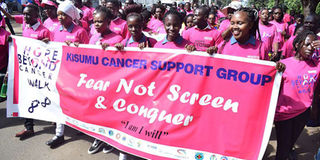Time to grasp the nettle, arrest cancer scourge

Kisumu Cancer Support group propagates cancer awareness in Kisumu on October 2, 2019. The prohibitive cost of diagnosis and treatment is a major hurdle. PHOTO | ONDARI OGEGA | NATION MEDIA GROUP
What you need to know:
- The incidences of cancer in Africa have been on the rise yet received little attention from the public health practitioners.
- The “Global Youth Tobacco Survey” indicates that more youths than adults in Africa smoke, exposing them to tobacco-related cancers.
Probably since only cases of prominent personalities who die of cancer get the limelight, there is a misconception that it is a disease for the rich and affluent.
Far from it. Statistics indicate that even the poor are not safe from the spectre of cancer — only that, for their lowly social status, most of them could have been misdiagnosed and perished without the true cause of death being established.
Shadowed by concerted efforts to fight HIV/Aids, cancer has stealthily emerged as the next big killer in Africa.
Let the government grasp the nettle and tackle this gruesome killer head on. First, the prohibitive cost of diagnosis and treatment is a major hurdle.
There is an urgent need for working cancer screening facilities, and qualified personnel, in all the 47 counties as well as a national cancer fund which should cover, among other things, subsidised cancer diagnosis and treatment.
A survey in the State-run Kenyatta National Hospital and privately owned Nairobi Hospital and Aga Khan University Hospital reveals deep financial strain for families of patients suffering from the four main strains of cancer: cervical, breast, oesophageal and prostrate.
COSTLY
With the average annual income of about Sh600,000 for Kenyans, diagnosis and treatment for the disease for most Kenyans is a nightmare.
The data is telling: it costs between Sh172,000 and Sh759,000 to treat cervical cancer without surgery in Kenya and Sh672,000-Sh1.25 million if one undergoes an operation.
Basic treatment for breast cancer costs Sh175,000 to Sh1.89 million and up to Sh2.48 million with surgery, such as lumpectomy or mastectomy.
Breast cancer is, by far, the most common with about 6,000 women and men diagnosed with the disease, according to the 2018 Globocan report under the aegis of the WHO’s Agency for Research on Cancer (ARC).
MEDICAL ADVANCES
A report by Dr Alice Musibi, of Kemri, says while cancer treatment in the developed world has improved immensely, the same cannot be said of Third World countries.
It cites testicular cancer, virtually lethal a few decades ago but not anymore in the former. In Kenya, such medical advances are yet to be realised owing to an underlying deficiency of resources and trained personnel.
There are more cancer cases being reported in Kenya than 10 years ago. According to a report by Cathleen Blanchard, of the American Cancer Society (ACS), the incidences of cancer in Africa have been on the rise yet received little attention from the public health practitioners.
“The Gobal Cancer Facts and Figures” points out that cancer in Africa has been receiving little attention from public health officials because of the high prevalence of HIV/Aids, malaria and tuberculosis cases.
LIFESTYLE
The “Global Youth Tobacco Survey” indicates that more youths than adults in Africa smoke, exposing them to tobacco-related cancers.
It warns that cancer cases in Africa are likely to double by 2030 and projects a sharp increase in global cancer cases from 10 million in 2000 to more than 15 million in 2020.
This calls for governments, physicians and health educators at all levels to help the people to change their behaviour and avoid these preventable cancers.
Mr Mwandambo is a blogger and freelance journalist. [email protected]





